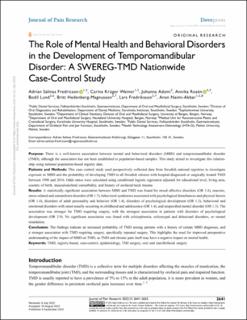| dc.contributor.author | Fredricson, Adrian Salinas | |
| dc.contributor.author | Weiner, Carina Krüger | |
| dc.contributor.author | Adami, Johanna | |
| dc.contributor.author | Rosén, Annika | |
| dc.contributor.author | Lund, Bodil Kristina | |
| dc.contributor.author | Hedenberg-Magnusson, Britt | |
| dc.contributor.author | Fredriksson, Lars | |
| dc.contributor.author | Naimi-Akbar, Aron | |
| dc.date.accessioned | 2023-02-08T14:46:19Z | |
| dc.date.available | 2023-02-08T14:46:19Z | |
| dc.date.created | 2022-09-26T13:04:54Z | |
| dc.date.issued | 2022 | |
| dc.identifier.issn | 1178-7090 | |
| dc.identifier.uri | https://hdl.handle.net/11250/3049417 | |
| dc.description.abstract | Purpose: There is a well-known association between mental and behavioral disorders (MBD) and temporomandibular disorder (TMD), although the association has not been established in population-based samples. This study aimed to investigate this relationship using national population-based registry data.
Patients and Methods: This case–control study used prospectively collected data from Swedish national registries to investigate exposure to MBD and the probability of developing TMD in all Swedish citizens with hospital-diagnosed or surgically treated TMD between 1998 and 2016. Odds ratios were calculated using conditional logistic regression adjusted for educational level, living area, country of birth, musculoskeletal comorbidity, and history of orofacial/neck trauma.
Results: A statistically significant association between MBD and TMD was found for mood affective disorders (OR 1.4), neurotic, stress-related and somatoform disorders (OR 1.7), behavioral syndromes associated with psychological disturbances and physical factors (OR 1.4), disorders of adult personality and behavior (OR 1.4), disorders of psychological development (OR 1.3), behavioral and emotional disorders with onset usually occurring in childhood and adolescence (OR 1.4), and unspecified mental disorder (OR 1.3). The association was stronger for TMD requiring surgery, with the strongest association in patients with disorders of psychological development (OR 2.9). No significant association was found with schizophrenia, schizotypal and delusional disorders, or mental retardation.
Conclusion: The findings indicate an increased probability of TMD among patients with a history of certain MBD diagnoses, and a stronger association with TMD requiring surgery, specifically repeated surgery. This highlights the need for improved preoperative understanding of the impact of MBD on TMD, as TMD and chronic pain itself may have a negative impact on mental health. | en_US |
| dc.language.iso | eng | en_US |
| dc.publisher | DovePress | en_US |
| dc.rights | Navngivelse-Ikkekommersiell 4.0 Internasjonal | * |
| dc.rights.uri | http://creativecommons.org/licenses/by-nc/4.0/deed.no | * |
| dc.title | The Role of Mental Health and Behavioral Disorders in the Development of Temporomandibular Disorder: A SWEREG-TMD Nationwide Case-Control Study | en_US |
| dc.type | Journal article | en_US |
| dc.type | Peer reviewed | en_US |
| dc.description.version | publishedVersion | en_US |
| dc.rights.holder | Copyright 2022 The Author(s) | en_US |
| cristin.ispublished | true | |
| cristin.fulltext | original | |
| cristin.qualitycode | 1 | |
| dc.identifier.doi | 10.2147/JPR.S381333 | |
| dc.identifier.cristin | 2055452 | |
| dc.source.journal | Journal of Pain Research | en_US |
| dc.source.pagenumber | 2641-2655 | en_US |
| dc.identifier.citation | Journal of Pain Research. 2022, 15, 2641-2655. | en_US |
| dc.source.volume | 15 | en_US |

